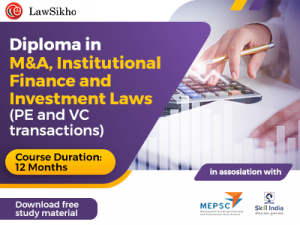
This article has been written by James Sibi, pursuing a Diploma in M&A, Institutional Finance, and Investment Laws (PE and VC transactions) from LawSikho.
Table of Contents
Introduction
The global pandemic had us adjust to new daily routines for our lives. What is today might not stand tomorrow. As things could change rapidly, we search for guarantees to alleviate risks. This is especially the case in mergers and acquisition transactions. Mergers and acquisitions, like any other transaction, are prone to a slew of disputes and disagreements that can derail the operation. The parties in a transaction want it to be completed as quickly as possible. With more prospective buyers and higher purchase prices, buyers want to make sure that the business purchased is worth it and are protected against undisclosed issues that arise post-closing of the transaction. Escrow services are a popular but underutilized tool that can be useful in certain transactions like mergers and acquisitions. An escrow agent may add a layer of assurance to any kind of transaction whether big or small.
What is an escrow agreement and how is it useful in M&a transactions?
An escrow agreement is an agreement by which a third party, as in an escrow agent, retains a part of the assets for the benefit of parties entered into a transaction and distributes them only after both parties have fulfilled a particular set of obligations under that agreement.
In Jeweltouch (India) Pvt. Ltd. v. Naheed Hafeez Quraishi & Ors., it was held that the concerned parties could appoint an escrow agent to determine whether a promise or precondition has been met or not to warrant the release of documents from escrow.
After the closing of the transaction, the seller may have certain post-closing obligations which include purchase price adjustments and indemnification. The buyer may have concerns about the seller’s ability to pay these post-closing obligations. There is a risk that the seller’s creditworthiness will not hold up or that the seller will refuse to pay without the threat of litigation. The buyer may have to pay the liability to a third-party creditor or suffer the loss while being unable to recover indemnity from the Seller. To ensure safety, the buyer demands that a portion of the purchase price be kept in escrow until the conditions specified in the escrow agreement are met. Escrow agreements would make it easier for buyers to track down each seller if there were multiple sellers. Sellers prefer that the holdback amount is placed into escrow with a third-party escrow agent rather than the buyer retaining them. 
Key considerations while drafting an Escrow agreement in an M&A transaction
Escrow agreements are a significant part of M&A deals. Despite the increased use of representations and warranty protection, recent evidence shows that the average percentage of transaction value set aside in escrow is increasing. Parties must negotiate a separate M&A escrow agreement in addition to deciding the size and length of the escrow. Parties and their counsels should focus on negotiating their deal and securing the best escrow conditions and fastest release terms possible.
Some of the key consideration before drafting an escrow agreement are :
- Selection of the escrow agent
- Amount of fund to be escrowed
- Investment of escrow funds
- Length of the escrow period
- Release of escrow
- Fees for the escrow service
- Ownership of escrow accounts for taxation purposes.
Selection of the escrow agent
No regulations are demanding a specific qualification to work as an escrow agent. It is entirely reliant on the agent’s trustworthiness. Since the parties want to invest money in an interest-bearing account rather than leaving it idle, the escrow agent in most M&A transactions is a bank or a financial institution. For their services, these institutions charge a fee, which is normally about 1% of the amount deposited. Since negotiating and closing an M&A deal takes too much time and effort, attorneys need an escrow partner they can trust and who understands their priorities, concerns, and goals.
Before choosing an escrow provider, it is important to thoroughly analyze them.
Evaluating various escrow agents and selecting the best one could be a difficult task. With online escrow agents emerging out as significant players, it is important to thoroughly analyze them before picking one.
There are a few things to consider before choosing an escrow agent
- Accessibility of the escrow service provider is of utmost importance. It’s crucial to think about whether the agent has the necessary resources to deal with language barriers and complete document negotiations as quickly as possible.
- Is the escrow agent a third-party impartial to both parties?
- How many transactions have they completed successfully in the past?
- Is the agent capable of efficiently addressing Know The Customer (KYC) requirements at the earliest?
Amount of fund to be escrowed
The deposit or holdback sum is usually 5 to 20% of the purchase price. When no insurance is used, the average escrow size as a percentage of the purchase price was 9.3%, while the median remained at 10%. The size of the escrow shrinks significantly if representation and warranty protection are included. The regular escrow size of 10% hasn’t changed much and remains fairly consistent over the years.
The only variable is the size of the contract, as smaller deals often have higher escrows as a percentage of transaction value than larger deals.
Execution and timings of Escrow agreements
Escrows are held for some time to protect the buyers of a business against any unforeseen financial losses after the closing. Buyers are usually worried that undisclosed liabilities will appear after closing. Typically, the funds are released to the seller at pre-agreed times, sometimes as early as six months after closing. While it would be rare for the entire escrow to be released in such a short time, buyers and sellers usually agree to release parts of the escrow after six or twelve months. The funds are issued only after all of the agreed-upon obligations have been met. This period may be used to check into the documents that the seller has produced. Certain documents that are issued by local authorities are often delayed and can be produced only after closing the transaction. Sometimes, the escrow duration might get extended dramatically. It’s important to use this opportunity to deal with any liabilities that were previously undisclosed, as well as to double-check the authenticity of documents such as representations and warranties.
Investment of escrow funds
The primary goal of using an escrow service is to ensure security in the transaction. Investing with the escrow fund, rather than leaving it idle, is always the better option. Both the buyer and seller should agree on how and where the escrowed fund is invested. A clause regarding the investment of the fund should be present in the agreement. After proper negotiations, this provision should give the right and authorization to invest the escrowed fund.
Release of the escrow fund
The escrowed fund is released to the seller after the inspection period is over. Both parties agree on the inspection period where the buyer investigates for any undisclosed liabilities and chance for breaches in representations and warranties. Escrow agents face difficulties when funds are released to a seller before the close of escrow. Even if the provision specifies that the money released is “non-refundable,” the seller will be required to return the funds if the buyer cancels the deal due to a new disclosure or the seller breaches the contract. Funds are usually released because the seller requires the money and uses it as soon as it is released. If repayment is needed, the seller would have no funds, and buyers and sellers turn to their agents to replace the funds.
When a large enough release is made before the closing, it often results in certain consequences :
- Sellers with a large release might attempt and terminate the contract on the false premise that the buyer is in default or refuse to allow extensions so that the seller can resell the property and retain the released funds as well as the purchase price
- Buyers who are unable to close on time claim misconduct on the part of the seller and agents to recover their funds.
A clause in a contract that allows money to be released to the seller before escrow closes is often risky. It should be avoided at all costs. At the very least, agents should make the lawyer of both the parties write and authorize this provision to avoid these consequences.
Allocation of escrow agents fees
The regular fee paid to an escrow agent is one percent of the total amount deposited in terms of money. Usually, the buyer is responsible for paying the agent’s fees. In certain cases, however, both parties may agree to share the costs. This must be properly negotiated before drafting the agreement. Smaller transactions have higher escrows as a percentage of the total deal value and more variance in the percentage of the amount which is kept back in escrow. However, escrow agents may charge a minimum fee for very small transactions.
Ownership of escrow for tax purposes
The party who will be regarded as the owner of the escrow account for tax purposes must be named in the agreement so that the escrowed funds are not considered revenue and taxable for the other party. For tax purposes, the buyer usually takes ownership of the escrow account, however, the buyer might demand a portion of the income received from the escrow deposit.
Conclusion
Escrow arrangements are a great mechanism for facilitating seamless transactions. An escrow process helps in the evolution of a company by facilitating efficient and secure business transactions. The regulatory and auditing requirements by the regulatory bodies, on the other hand, are the deciding factor in its security. The administrative drive on escrow seems to be on the correct course in terms of creating a more platform for online payments. Escrow contracts allow the bidder to lay claim on the funds placed in the escrow account after the acquisition of the seller fails to meet specific terms of the acquisition agreement or it is found that negative information about the target was hidden from the bidder. Escrow is an efficient tool that assists the parties to a transaction handle risk and reduces asymmetry in information. However, a greater understanding of escrow arrangements is required for the parties to transact safely and seamlessly.
Students of Lawsikho courses regularly produce writing assignments and work on practical exercises as a part of their coursework and develop themselves in real-life practical skills.
LawSikho has created a telegram group for exchanging legal knowledge, referrals, and various opportunities. You can click on this link and join:
 Serato DJ Crack 2025Serato DJ PRO Crack
Serato DJ Crack 2025Serato DJ PRO Crack









 Allow notifications
Allow notifications


